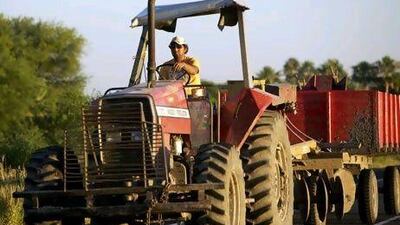Recession may finally do what a decade of bickering by world leaders has not: put an end to western farm subsidies, which many blame for keeping developing countries from becoming food self-sufficient.
Last month, the latest round of the Doha talks - the decade-long discussions to end trade imbalances - sputtered to a halt. Delegates from around the world departed, having agreed on almost nothing, once again leaving the future of the forum in doubt.
A key sticking point, as always, was the vast amount of money that developed economies spend on their farmers. In Africa, Asia and elsewhere, farmers are taxpayers; in the US and Europe, they are tax-receivers.
Industrialised countries are spending more than US$350 billion (Dh1.28bn) a year in subsidies, according to the Organisation for Economic Co-operation and Development (OECD). Today, almost a quarter of the income of farmers in western Europe and the US comes from state handouts.
The result is overproduction in the west. Much of that finds its way to the markets of poorer countries, where it competes with local products. But a lot of it is simply left to rot. Western consumers chuck out up to 115 kilograms per person per year - about 220 million tonnes, according to a report by the UN Food and Agriculture Organisation.
This is more than the entire food production of sub-Saharan Africa. African and South East Asian consumers, by contrast, throw out less than 11 kilograms a person - an extraordinary disparity when the lack of home refrigeration is taken into account.
At the same time, the subsidies are not being directed at humble sod busters. In the US, which has had subsidies since the 1930s, recipients tend to be corporations and wealthier landowners. Some recipients are not even American; the US is obliged to pay Brazilian cotton farmers $150 million a year, in a complicated arrangement that allows subsidies of its own farmers to continue without falling foul of World Trade Organisation rules.
The result is overproduction and a mountain of surplus food that finds its way to Africa and Asia, where it is sold in direct competition to what local farmers are growing.
The issue is not new. In 2002, James Wolfensohn, the president of the World Bank at the time, said western subsidies were "crippling Africa's chance to export its way out of poverty". Developed countries defend these subsidies as a method of ensuring food security. Too much food, rather than too little, is the guiding philosophy.
This may be about to change. The US is under pressure to cut its rampant deficit and the EU is scrambling to bail out the spendthrift members of its club, such as the Greeks.
In the US, the budget committee of the House of Representatives is picking over the books to see where it can trim spending and is looking at slicing $30bn off agricultural subsidies over the next 10 years. And the Obama administration is pressing for at least $5bn of that to come off the 2012 budget.
As these subsidies date back to the Great Depression, the proposed cuts will be fiercely contested, but the indications are that they appeal across sectarian lines. Now that food prices are achieving record prices, farming is a rare industry enjoying a boom period even as many other industries struggle to survive.
Across the Atlantic, resistance to European cuts is expected to be especially fierce, particularly from France, the EU's biggest beneficiary of farm subsidies.
"Let no one imagine that France will accept a cut in the Common Agricultural Policy budget," Nicolas Sarkozy, the French president, said this month.
He may not have much choice. The EU budget commissioner, Janusz Lewandowski, is supporting cuts amid calls for austerity. And given a European mood that appears to be tiring of the common-borders experiment, it is likely that public pressure to cut back on pet causes will increase.
Of course it is unrealistic to expect industrialised countries to stop paying their farmers any time soon. Fear of rising prices and the ongoing biofuels fad will keep lobbyists busy. But the tide has clearly turned, and governments are now talking of reducing subsidies when just a few years ago they were all for increasing them.
For farmers in the developing world, this is good news. Doha may be dead, but it is clear that agriculture no longer enjoys its untouchable status. The developing world may just get a fair shot at competing against the richer nations after all.

